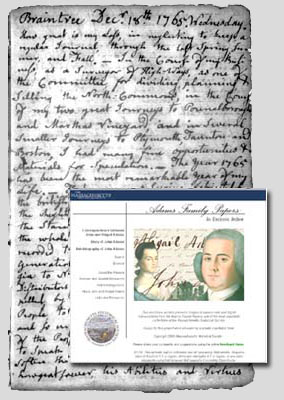John Adams diary 11, 18 - 29 December 1765

From the Adams Family Papers
The transcription of this entry (for 18 December 1765) from Adams's diary (diary 11, page 1) is featured on the Adams Family Papers: An Electronic Archive website.
Online display of the diary.
The Cost of ResistanceOn 1 November, with stamp masters having resigned their commissions and the stamps locked away in forts under the command of royal forces, no one is quite sure how to go on with business without getting into trouble. Rhode Island has voted to protect from harm all colonial officials who disregard the stamps and proceed with daily affairs as usual. But Massachusetts' assemblymen refuse to pass such a measure, arguing that to do so acknowledges the Stamp Act's legitimacy. Meanwhile the ports and courts are closed; lawyers are idle and trade is at an impasse. As public officials in executive, legislative, and judicial jurisdictions pass the buck from one to another and back again, John Adams turns to his diary to bemoan the loss of his recently won reputation and of his income.
Questions to Consider
1. Consider the provisions of the Stamp Act. What activities should be avoided because they require stamps? Write a paragraph about how everyday life will be affected if people simply refuse to engage in activities requiring stamps.
2. Another option is to ignore the Stamp Act and proceed with business as usual. Consider the penalties provisions (17-27) of the Stamp Act. What do merchants stand to lose? Farmers? Royal appointees?
3. What does Adams mean by the phrase "passive Obedience to the Stamp Act." How does he characterize it? What does he fear may result from it? Does he believe that this condition will continue? Why or why not?
Further Exploration
4. Adams considers his own self-interest. Compare his reflections to those of James Murray. What in their views might characterize one as a loyalist and the other as a patriot? (Click here to read James Murray's letter to his brother concerning the Stamp Act.
5. Today the right to be taxed by a vote of our own representatives might seem like a somewhat obscure or remote concept. Think about the times in which we now live. What right would you be willing to stand up for? What would you be willing to sacrifice for it?
Funding from the Massachusetts Society of the Cincinnati supported enhancements to this website.



